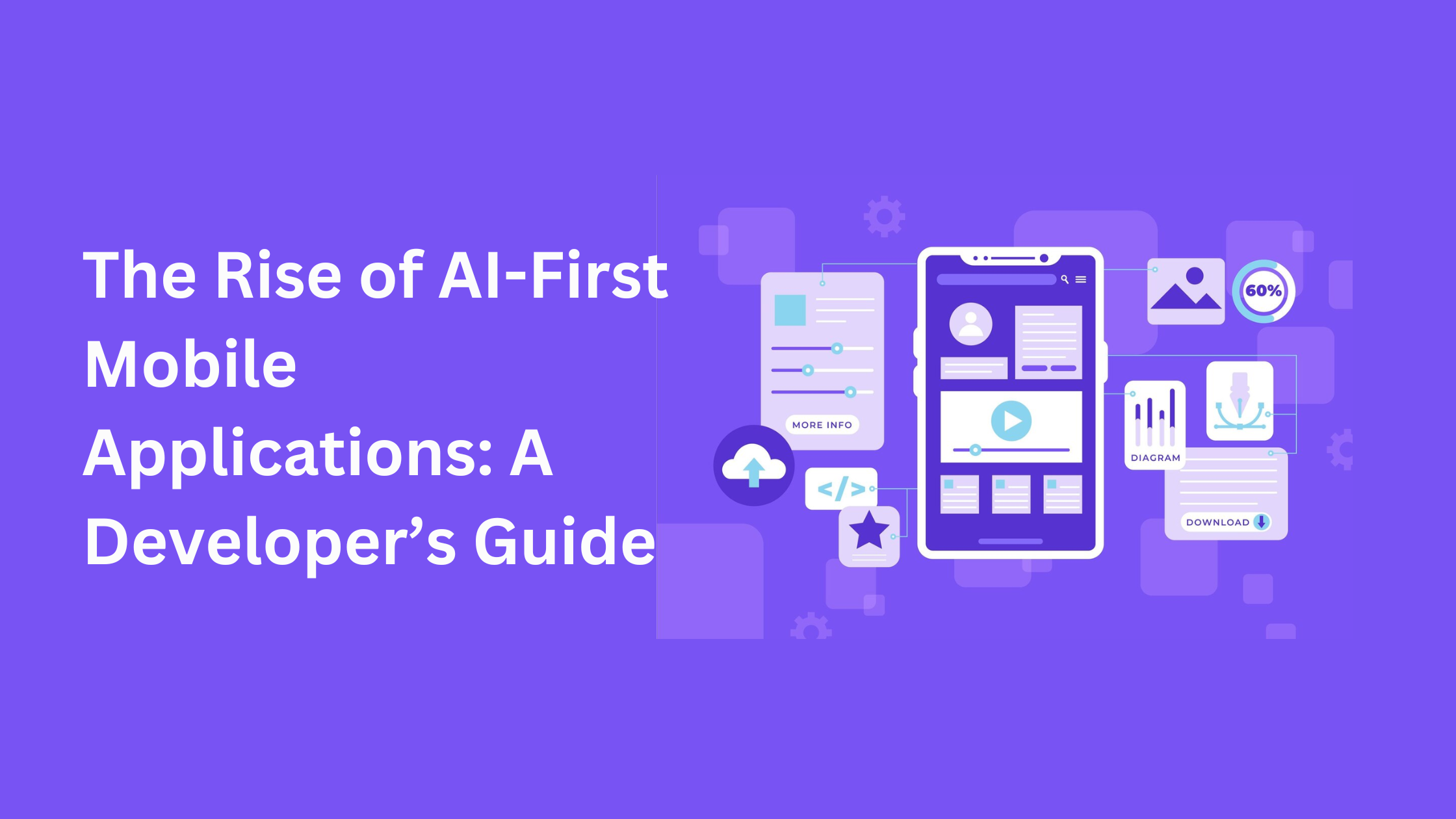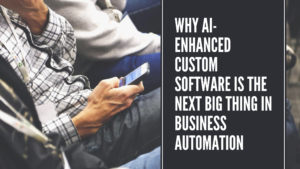The Rise of AI-First Mobile Applications: A Developer’s Guide
Artificial intelligence is no longer just an enhancement in mobile app development—it’s the foundation. AI-first mobile applications are transforming the industry, pushing developers beyond traditional coding and into a world where machine learning, automation, and intelligent decision-making drive the user experience.
From personalized recommendations to predictive analytics, AI-first applications are setting new standards. But what does this shift mean for developers? How do they transition from conventional app development to AI-driven design?
Let’s take a deep dive into the rise of AI-first mobile applications and what developers need to know to stay ahead.
Understanding AI-First Mobile Applications
AI-first applications don’t just integrate AI as a feature—they are built around AI as the core engine. Unlike traditional mobile apps that rely on static rules and pre-programmed logic, AI-first applications continuously learn, adapt, and improve through data analysis and user interactions.
The rise of AI-first apps is driven by several factors:
- Advancements in AI and machine learning frameworks that make AI integration more accessible.
- User demand for hyper-personalized experiences that static apps can’t provide.
- The need for automation to streamline processes and reduce human intervention.
For developers, this shift requires a new mindset—one that prioritizes AI-driven workflows, intelligent automation, and data-powered decision-making.
Key Components of AI-First Mobile Applications
AI-first applications are defined by several core technologies. Understanding these is crucial for developers looking to build future-ready apps.
1. Machine Learning & Predictive Analytics
At the heart of AI-first apps is machine learning (ML). Unlike traditional apps that operate based on predefined rules, ML models enable apps to:
- Predict user behavior and personalize interactions.
- Analyze large datasets to make real-time decisions.
- Continuously improve based on feedback loops.
For example, AI-first fitness apps don’t just track activity—they analyze patterns and suggest workouts tailored to individual progress. E-commerce apps predict purchase intent and recommend products before users even search for them.
2. Natural Language Processing (NLP) & Conversational Interfaces
AI-first mobile applications are shifting away from static menus and buttons. Instead, they incorporate natural language processing (NLP) to enable human-like interactions.
Developers are leveraging NLP to build:
- AI chatbots that provide seamless customer support.
- Voice assistants that enable hands-free app control.
- Real-time language translation tools that break communication barriers.
Apps like Google Assistant, Alexa, and Siri have set the benchmark, but AI-first applications are now embedding similar capabilities across industries.
3. Computer Vision for Smart Interactions
AI-first apps are increasingly using computer vision to analyze images, recognize faces, and interpret gestures. This technology is making mobile applications smarter and more interactive.
Popular applications of computer vision in AI-first apps include:
- Facial recognition for authentication.
- AR-powered shopping experiences where users can try on clothes virtually.
- Smart scanning tools that extract data from images and documents.
Developers looking to build AI-first applications should explore platforms like TensorFlow and OpenCV to integrate computer vision into their apps.
4. Autonomous Decision-Making & Automation
AI-first apps don’t just provide recommendations—they make decisions. Autonomous decision-making enables applications to:
- Automate workflows without manual intervention.
- Optimize in-app processes based on data insights.
- Detect anomalies and trigger real-time responses.
For instance, AI-powered banking apps can detect fraudulent transactions instantly and block them before they cause damage. AI-first healthcare apps can analyze symptoms and suggest diagnoses with high accuracy.
How AI-First Development is Changing the Developer’s Role
The shift to AI-first applications is redefining what it means to be a mobile app developer. It’s no longer just about coding; it’s about building intelligent systems that learn, adapt, and evolve.
5. The Rise of AI-Powered Development Tools
Developers no longer need to write every line of code manually. AI-powered development tools are now assisting with:
- Automated code generation using AI models like OpenAI’s Codex.
- Intelligent debugging that predicts and fixes errors in real-time.
- Code optimization to enhance performance and reduce redundancy.
AI-driven platforms are streamlining the development process, allowing developers to focus more on architecture and innovation rather than repetitive coding tasks.
6. Data Science Skills Are Becoming Essential
In AI-first development, understanding data science is as important as understanding programming languages. Developers need to:
- Train and fine-tune machine learning models.
- Analyze user data to improve app performance.
- Implement AI algorithms that enhance user experience.
This means that future mobile app developers must be comfortable working with Python, TensorFlow, and data visualization tools alongside traditional programming languages like Swift and Kotlin.
7. Ethical AI & Responsible Development
AI-first applications are powerful, but they come with ethical challenges. Developers must be aware of:
- Bias in AI models, ensuring algorithms are fair and unbiased.
- User privacy concerns, implementing strict data protection measures.
- AI transparency, making sure users understand how decisions are made.
AI-first apps should enhance user experiences without compromising ethics. Developers must take a responsible approach to AI deployment.
The Challenges of AI-First Mobile App Development
Despite its advantages, AI-first development comes with challenges that developers must address.
8. High Computational Demands
AI models require significant processing power. Running machine learning algorithms on mobile devices can strain performance and battery life. Developers are tackling this by:
- Using on-device AI for lightweight tasks.
- Leveraging cloud-based AI services like Google’s Firebase ML and AWS AI.
- Implementing edge computing to reduce latency and enhance speed.
9. Data Privacy & Security Risks
AI-first apps rely heavily on user data, making privacy a major concern. Developers must ensure:
- Data is collected transparently and with user consent.
- AI-driven decisions are explainable and not intrusive.
- Security measures like encryption and biometric authentication are implemented.
Regulatory frameworks like GDPR and CCPA are evolving, and developers must stay compliant while building AI-powered apps.
10. Complexity in AI Model Training & Deployment
Training AI models requires expertise, large datasets, and continuous monitoring. Developers must balance accuracy, efficiency, and scalability when deploying AI-first applications.
Pre-trained models and AI-as-a-Service platforms are helping bridge the gap for developers who are not AI specialists, allowing them to integrate AI without building models from scratch.
The Future of AI-First Mobile Applications
AI-first development is just getting started. The next phase of AI-driven apps will focus on:
- Neural interfaces, where users interact with apps using brain-computer integration.
- Self-learning AI models, that improve without external training.
- AI-powered augmented reality, blending digital experiences with the physical world.
For developers, staying ahead in this evolving landscape means continuously learning and adapting. The tools, frameworks, and best practices for AI-first mobile app development will continue to evolve, and those who embrace the change will lead the industry.
Conclusion: AI-First Development is the Future
AI-first mobile applications are no longer optional—they are the future of app development. Businesses that want to stay competitive must invest in AI-driven solutions, and developers must adapt to the new wave of intelligent app creation.
From machine learning-powered personalization to autonomous decision-making, AI-first development is changing how apps are built, how users interact with them, and how businesses scale their digital strategies.
If you’re looking to develop an AI-first application, it’s essential to hire mobile app developers in Atlanta who understand the intricacies of AI-powered mobile solutions. The future of mobile apps isn’t just about code—it’s about intelligence. Are you ready for the AI revolution?




